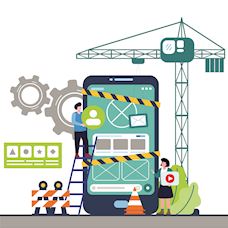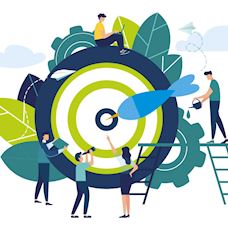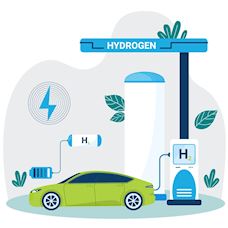
Navigating the rise of technology in construction
In this article we’ll dive into the booming world of smart construction technology, exploring the innovations driving the change and what the future looks like for the industry.

Just over a month into the New Year and already resolutions are fading and we're sliding back into the same old patterns. Except that in my case – and I don't mean to sound smug here – I'm not!
I've decided to give mindfulness a go, the practice of being fully in the present moment, and I'm already impressed by the difference it's making.
Now I know that mindfulness has been talked about a lot, but for the benefit of those who still aren’t convinced – and I was one of them until recently – I'm going to share my whistle-stop tour of its benefits and why it fits in so well with Clear B2B’s mantra “The difference is clear thinking.”
What mindfulness is
Basically, mindfulness is about observation without criticism – about paying attention to our thoughts and feelings without judging them. It's usually practised through simple breathing meditation in which you focus on the breath in and the breath out and observe your thoughts as they emerge and then drift away.
In time, this practice helps you to learn to fully attend to whatever you're doing right now, whether that's taking a shower or making an important work decision. Focused, objective thinking. Surely we’d all benefit from more of that?
What mindfulness isn't
So why am I telling you about this? Well, I believe that mindfulness has a role to play in reducing the stress that's causing so many people to feel depressed, anxious, or just plain burnt-out.
Mental ill health is now the leading cause of sickness absence in the UK and accounts for 70 million sick days every year. This costs British business more than three billion pounds. And it's not just us Brits. The World Health Organisation says that deteriorating mental health represents one of the most serious health challenges for Western society in the twenty-first century.
The benefits of mindfulness
So how can mindfulness help? Well, lots of research studies have looked at the impact of mindfulness in the workplace and they've found that mindfulness can:
I’m sure you’ll agree that’s a pretty compelling set of reasons for marketing communications specialists.
And me? I've experienced three key benefits so far:
Don't get me wrong. I'm not saying that after just a few weeks, I'm a completely new person and fizzing with so many brilliant ideas I may well pop. What I am saying is that I'm more open to seeing things differently and less prone to what's known as 'cognitive rigidity' (the tendency to be blinded by experience). So there is definitely more fizz. In a creative industry like ours, this can only be good news and so it's maybe not surprising that creative and innovation-based companies like Apple, Google, Target and McKinsey & Company have implemented mindfulness programmes to boost creativity.
In the light of all this, if you're looking for ways to free up your own thinking in 2018 and create a happier, more creative and productive workforce, take a look at mindfulness. It’s easy… you can simply download an app, or if you want to want to explore mindfulness with a good dose of humour then I can certainly recommend Ruby Wax’s book ‘A Mindfulness Guide for the Frazzled’.



In this article we’ll dive into the booming world of smart construction technology, exploring the innovations driving the change and what the future looks like for the industry.

Learn how to use presentation opportunities as an effective lead-generation tool in your trade show activity.

Great marketing success comes from keeping your communications focused, engaging and simple to ‘get’ - but that isn’t always so simple to achieve.

With multiple types of technologies being considered, we bring you a snapshot of alternative fuels and review the most prominent pros and cons for each one.